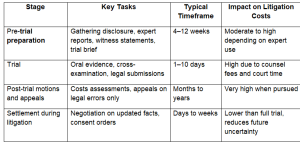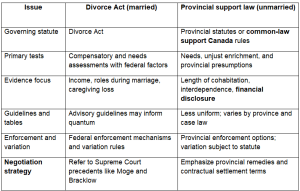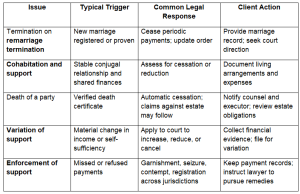The Role of a Lawyer in Negotiating Spousal Support
Updated: 19 Sep 2025
77
In Canada, about one in three couples going through a split face spousal support issues. Yet, many start talks without knowing the law. This can lead to long, stressful battles in court and high costs.
A family lawyer in Canada can make these talks clearer. They explain the laws, look at finances, and set goals. They help whether it’s a formal Divorce Act claim or a provincial support matter after a split. Their goal is to protect their client’s interests and ease emotional stress.
Skilled spousal and partner support lawyers in Canada deal with complex financial details. They write settlement agreements and work out payment plans. They also prepare for court, where judges have a lot of power. Things like remarriage or a big financial change can end support.
Good spousal support negotiation is more than just numbers. It’s about strategy, making sure agreements can be enforced, and securing financial stability for the future. A good lawyer balances today’s needs with tomorrow’s freedom. They aim for a settlement that lasts.
How a Lawyer Explains the Legal Framework for Spousal Support in Canada
A lawyer starts by explaining the rules for spousal support. The Divorce Act covers married couples getting a divorce. Laws in each province deal with separated partners and other situations.
They then discuss the factors judges look at. The Divorce Act mentions things like income, needs, and how long the couple lived together. But, it doesn’t consider spousal misconduct. This helps clients understand how courts make decisions.
Lawyers talk about the reasons for spousal support. The Divorce Act aims to balance financial advantages and disadvantages. It also helps with childcare costs and supports those facing financial hardship.
Judges have a lot of freedom in making decisions. This is because the laws are broad. Two important court cases, Moge v. Moge and Bracklow v. Bracklow, have shaped how things are done today.
The lawyer also mentions Bracklow v. Bracklow. This case showed that need can justify support. It also made it clear that judges make decisions based on each case.
They then introduce the Advisory Guidelines. These guidelines help predict support amounts. They show how these guidelines work with court decisions and provincial laws.
Lastly, the lawyer explains how evidence is used. Income, caregiving, and how long a couple lived together are important. This helps clients understand how the law applies to their situation.
Initial Client Assessment and Gathering Evidence
At the first meeting, the lawyer helps focus the intake. They give a checklist and explain which records are most important. This step helps set a path for negotiation or litigation.
Reviewing financial disclosure, income documents, and budgets
Counsel looks at bank records, tax returns, and more to check claims. They review income documents to understand earnings and any short-term changes. Budgets are key because courts often use them to judge need.
Lawyers make sure debts and ongoing expenses are included in a realistic budget. Presenting financial information clearly helps in settlement talks.
Assessing length of relationship, roles during cohabitation, and standard of living
Time together is important. A longer relationship often means a stronger claim for support. Counsel documents roles, caregiving, and career sacrifices that affected earnings.
They gather receipts and photos to show typical spending and housing choices. This helps compare post-separation life to the couple’s past lifestyle.
Identifying compensatory versus needs-based claims
Lawyers start by figuring out if claims are compensatory or needs-based. Compensatory claims need proof of lost earning capacity, like medical records.
Without exact proof, needs-based support might be the better choice. Counsel checks if the client can show they are impoverished or disabled.
Throughout, counsel collects evidence for future changes or termination issues. This preparation keeps options open if things change.
Strategizing Negotiation Goals and Priorities
A clear negotiation strategy starts with knowing what the client wants and what the lawyer can get. The lawyer turns spousal support goals into specific targets. This keeps talks on track and avoids emotional decisions.
Balancing compensation, need, and self-sufficiency
The lawyer looks at compensation, immediate needs, and self-sufficiency. They consider case law for each goal. Offers are made based on the client’s financial situation, covering loss of income and short-term needs.
Setting realistic expectations based on advisory guidelines and case law
Advisory guidelines are useful for setting amounts and durations. The lawyer explains the trade-offs and possible court decisions. Clients get clear scenarios for best, mid, and cautious outcomes to make informed choices.
Preparing fallback positions and settlement ranges
Fallback positions are key in any settlement plan. Lawyers create ranges based on relationship length, living standards, and income. Each fallback includes triggers for future changes, like remarriage, to show long-term effects.
When talks hit a snag, the team moves to more realistic goals. A clear plan, based on guidelines and fallbacks, lowers stress and speeds up the process.
Mediation and Alternative Dispute Resolution Skills
Lawyers help clients get ready for mediation by making them feel less anxious and setting achievable goals. They explain what legal rights are, what might happen, and what settling means. They also practice tough conversations and teach how to make offers simply.
How lawyers prepare clients for mediation sessions
Before the meeting, lawyers go over financial details and write down clear proposals. They show how the Spousal Support Advisory Guidelines can help find fair ranges. They also talk about when support might change, like if someone gets remarried.
Lawyers work on scripts for hard topics and set clear rules for negotiations. They make sure the settlement language is clear about how much, for how long, and when it might change. This careful planning helps avoid surprises.
Techniques to reduce conflict and encourage settlement
Good negotiators focus on making things stable for the future, not blaming the past. They talk about practical trade-offs to show the benefits of agreeing. They offer different ways to pay support, like regular payments or a one-time payment, to give choices.
Mediators and lawyers use private talks to calm things down. They help separate emotional issues from legal ones. They also show how agreements can be enforced, which helps keep the peace.
Using income-sharing concepts and informal guidelines to frame offers
Income-sharing ideas help divide support in a practical way without needing to know every detail. Lawyers use these ideas along with the Spousal Support Advisory Guidelines to make offers that judges will understand. This makes offers seem fair and based on common practices.
When people see offers based on income-sharing, talks become less about blame and more about finding solutions. Clear options help reach agreements through ADR family law instead of court.
Drafting and Reviewing Settlement Agreements
When drafting settlement agreements, lawyers focus on clarity and foresight. They explain how payments and time frames relate to Advisory Guidelines. This helps clients understand the reasoning behind the proposals.
Clear language reduces future disputes and keeps client goals in sight.
Ensuring clear wording on amount, duration, review, and termination clauses
Lawyers use precise language to avoid confusion on payment amounts and duration. They simplify complex schedules to make obligations clear. They also outline events that can end payments, like remarriage or death, in simple terms.
Incorporating change-of-circumstance triggers and variation processes
Variation triggers allow for agreed adjustments or judicial changes when big changes happen. The agreement sets out review timelines and the process for making changes. This approach avoids quick lawsuits and offers a clear path to address new facts.
Protecting client interests with enforceability and tax considerations
Drafting for enforceability includes steps for resolving disputes, payment security, and clear remedies for non-payment. Lawyers consider the tax impact of spousal support, recommending lump sums or periodic payments. They draft to minimize tax consequences and meet client needs.
Ethical duties guide the review of debts, assets, and full disclosure. A careful draft documents shared assumptions and the basis for calculations. This ensures courts and enforcement bodies can understand the agreement consistently. The result is a lasting, clear contract that benefits clients in the long run.
Negotiating Complex Financial Issues
When financial issues get complicated, a lawyer helps clients understand them. They look at retirement benefits, business interests, and assets. This helps clients see the risks and choices they have.
Lawyers explain the trade-offs clearly. They talk about getting cash now versus getting money over time. This helps clients make informed decisions.
Handling pensions, capital assets, and business valuations
Lawyers carefully look at pension division. They consider pension plan rules and how to transfer funds. They also check how to handle capital assets like real estate and investments.
For private companies, getting a fair business valuation is key. It helps make offers and avoid future disagreements.
Working with forensic accountants and vocational experts when needed
When assets are complex, forensic accounting is used. It helps find income and cash flow. Experts look at financial history and check valuation assumptions.
Vocational assessments help with claims. They estimate what someone can earn and when they can go back to work.
Converting lump-sum versus periodic payment proposals
Turning periodic payments into a lump sum needs careful math and tax analysis. A lump sum can end payments and transfer risk. But, it might reduce savings.
Periodic payments keep income coming but can be uncertain. They might change or stop.
Teams with forensic accountants and vocational experts help negotiate. Lawyers write clear terms for payments, security, and reviews. This aims to avoid future problems and ensure fairness.
Representing Clients in Court When Negotiations Break Down
When talks fail, lawyers take the case to court. They need to prepare well, tell a strong story, and manage what clients expect about time and money.
Preparing evidence and witness statements for trial
Lawyers gather financial documents, work records, and budgets. They also prepare statements from the parties and experts. They plan how to question the other side’s evidence.
They organize documents to follow court rules. They practice with witnesses to make sure they give clear, helpful testimony.
Arguing legal principles from Moge v. Moge and Bracklow v. Bracklow and applying statutory factors
Lawyers build arguments based on the Divorce Act and cases like Moge v. Moge. They use Bracklow v. Bracklow to explain why some cases need special treatment.
They connect the facts of the case to the law. This helps judges decide on support amount and length.
Managing the costs and timelines of litigation versus settlement
Lawyers talk to clients about what litigation might cost and how long it could take. They also explain the emotional impact and the limits of appeals.
They help clients decide if fighting for support is worth the cost and delay. They suggest going to trial only if the outcome is likely to be good enough to justify the effort.

Spousal and partner support
Lawyers help clients navigate two systems for spousal and partner support in Canada. They explain how federal rules under the Divorce Act work with provincial laws. This shapes what support is available for different types of relationships.
Explaining entitlement for married and unmarried couples under federal and provincial regimes
In a divorce, the Divorce Act decides support entitlement. For relationships ending without divorce, provincial laws and common-law support Canada rules apply. Lawyers compare these laws to predict outcomes.
How need and compensatory bases apply differently to partners versus spouses
Both compensatory and need-based claims are important. Lawyers look at lost earning capacity, caregiving, and immediate needs. Unmarried couples face different rules for compensatory claims than spouses under the Divorce Act.
Practical negotiation differences for separation outside divorce proceedings
Negotiations for unmarried couples rely on provincial precedent and contract principles. Counsel explains enforcement options, limits, and the importance of cohabitation history in offers.

Addressing Termination, Variation, and Enforcement Issues
Lawyers help clients with support order changes and endings. They explain Canada’s rules on remarriage and cohabitation. They also talk about when death ends support and when courts can change orders.
Grounds for ending support
Remarriage often stops support payments. Courts see a new marriage as a big life change.
Cohabitation issues come up when someone lives with a partner in a stable relationship. Lawyers check if the couple shares expenses and commitment enough to stop support.
Death automatically ends most support duties. Lawyers guide clients on closing matters to avoid legal issues for the estate.
When modification is appropriate
Support can change if income goes up or down, or if someone becomes self-sufficient. A court must agree there’s a big change.
Agreements with clear review rules can avoid fights. This makes sure everyone knows what to expect and reduces legal battles.
Practical enforcement tools
Enforcing support includes garnishment, asset seizure, and registering orders. Lawyers prepare clients for these steps when payments stop.
There are also contempt proceedings and agreements to enforce support. Lawyers help draft clauses to avoid future disputes and make enforcement easier.

Supporting Clients Post-Settlement
After a settlement, it’s important to keep its value and ensure future security. Lawyers help clients understand tax rules and how to manage money. They offer advice to avoid surprises and help clients move towards financial freedom.
Advising on tax, budgeting, and transitioning to financial independence
Lawyers explain how spousal support taxes work. They help clients file correctly to avoid penalties. They also explain if payments are taxable or deductible in Canada.
Starting a budget after divorce is simple. It involves listing income, essential expenses, and debt payments. Financial experts from RBC and BMO can help turn legal settlements into workable monthly plans.
Guiding clients on re-partnering implications and future negotiations
Re-partnering can change or end support obligations. Lawyers explain how living arrangements affect these changes. They also advise on documenting changes to avoid future disputes.
When considering remarriage, lawyers explain the rules in different provinces. They prepare clients for future negotiations and warn about giving up rights without understanding the long-term effects.
Helping clients understand long-term consequences of settlement choices
Choosing between a lump sum or regular payments impacts cash flow and investment. Lawyers show how each choice affects finances over time.
Long-term planning connects settlement choices to retirement and other financial goals. Advisers might suggest working with financial experts to align legal decisions with financial plans.
Keeping advice simple and following up is key. Regular reviews help budgets adjust to life changes. This ensures clients understand spousal support tax implications.
Ethics, Confidentiality, and Client Communication
A lawyer starts by explaining their duties and limits right away. This builds trust and helps clients understand how laws like Moge and Bracklow can shape the outcome. They explain the negotiation options, timelines, and costs in simple terms.
Maintaining confidentiality during sensitive financial negotiations
Keeping client information private is key in family law cases. Lawyers protect sensitive documents like bank records and tax returns. They only share what’s necessary and use secure ways to send information.
This helps avoid any unfair advantage in negotiations or court.
Fiduciary duties, conflict checks, and informed consent
Lawyers must follow strict rules in spousal support cases. They check for any conflicts before taking on a case. If a conflict is found, they tell the client and ask for their okay or step aside.
They document this consent so clients know what they’re agreeing to. This includes understanding the trade-offs in settlement choices and any limits on the lawyer’s help.
Keeping clients informed and emotionally supported through the process
Lawyers keep clients updated to reduce stress and help them make informed decisions. They share the negotiation strategy, the case’s strengths and weaknesses, and the chances of a judge’s decision. They aim to balance legal advice with empathy, referring clients to experts when needed.
Every step is guided by rules and best practices. This ensures clients’ interests are protected and the lawyer’s integrity is maintained.
Conclusion
Family lawyers play a key role in Canada’s spousal support negotiations. They help clients understand the complex legal system. This includes the Divorce Act, provincial rules, and important cases like Moge and Bracklow.
They collect financial evidence and use the Spousal Support Advisory Guidelines. Their goal is to find a balance between fairness and self-sufficiency. This prepares clients for mediation or court, aiming for fair support outcomes.
Lawyers also create enforceable agreements and work with experts for valuations. If negotiations fail, they represent clients in court. They consider the costs and timelines of litigation.
They draft clauses for managing changes in support due to remarriage, cohabitation, death, or financial changes. This ensures the agreement is flexible and enforceable.
After reaching a settlement, lawyers offer advice on taxes, budgeting, and long-term planning. They help clients plan for a stable financial future. Throughout, they follow ethical duties and communicate clearly to support clients emotionally and legally.
FAQ
What role does a lawyer play in negotiating spousal or partner support?
A lawyer helps clients understand their legal options. They protect their interests and reduce stress. They review financial details, set priorities, and prepare settlement language.
They also mediate, retain experts, and represent clients in court. They advise on budgeting, tax, and enforcement after the settlement.
How does a lawyer explain the legal framework for spousal support in Canada?
A lawyer explains that the federal Divorce Act governs support in divorces. Provincial and territorial statutes cover separations outside divorce. They outline the statutory objectives and the judges’ broad discretion.
What are the key statutory factors courts consider in support claims?
Courts consider several factors, including each party’s condition, means, and needs. They also look at the length of cohabitation and the functions performed during the relationship. Misconduct is not considered.Judges balance multiple objectives, not just one theory.
What evidence do lawyers gather at the start of a support negotiation?
Lawyers collect financial information like tax returns and bank statements. They also gather asset and debt schedules, pension valuations, and budgets. Evidence of roles during cohabitation and childcare responsibilities is also collected.They look for signs of future changes that could affect support.
How do lawyers distinguish compensatory claims from needs-based claims?
Lawyers determine if the claim is for compensatory loss or need. Compensatory claims often need expert evidence. Needs-based claims rely on budget proxies and the marital standard of living.
How do lawyers set negotiation goals and realistic expectations?
Lawyers balance the Divorce Act’s objectives and use the Spousal Support Advisory Guidelines as a benchmark. They draw on case law to frame likely outcomes. They prepare settlement ranges and fallback positions based on various factors.
How do lawyers prepare clients for mediation or alternative dispute resolution?
Lawyers educate clients on their rights and likely outcomes. They coach on difficult conversations and structure offers. They present options to reduce conflict and encourage settlement.
What drafting issues do lawyers focus on in settlement agreements?
Lawyers ensure clear wording on amount, duration, and review mechanisms. They include termination clauses and objective triggers for variation. They also include enforcement provisions and tax and pension consequences.
How are complex financial issues handled during negotiations?
Lawyers identify and value pensions, assets, and business interests. They often retain experts for valuation. They analyze the pros and cons of lump-sum versus periodic payments.
What happens if negotiations break down and the case goes to court?
Lawyers prepare trial-ready files with witness statements and expert reports. They frame arguments under statutory factors and case law. They advise on litigation costs, timelines, and the limited scope of appeals.
How does entitlement differ for married versus unmarried partners?
Entitlement in divorces is governed by the Divorce Act. Separations outside divorce fall under provincial/territorial statutes. Lawyers explain that principles from Moge and Bracklow guide both systems.
What are common grounds for termination or variation of support?
Support commonly terminates on remarriage, stable cohabitation, or death. Variation applications can succeed with a material change in financial circumstances. Lawyers gather evidence of foreseeable changes to reduce disputes.
What enforcement options exist for non-payment of support?
Lawyers explain remedies like enforcement orders and garnishment. They draft clear enforcement clauses. They advise on practical steps to collect unpaid support while weighing cost and speed.
How do lawyers help clients after a settlement is reached?
Lawyers advise on tax filing implications and budgeting. They help clients understand re-partnering effects on support. They plan for future variations and may refer clients to financial planners or counsellors.
What ethical duties do lawyers have during spousal support negotiations?
Lawyers maintain confidentiality and perform conflict checks. They obtain informed consent for settlements. They communicate transparently about risks, likely outcomes, and costs.
How do Advisory Guidelines fit into negotiations and settlements?
Lawyers use the Spousal Support Advisory Guidelines as an objective starting point. They employ the Guidelines to set realistic expectations. They warn clients of their limits and the continuing possibility of judicial variation.

Please Write Your Comments